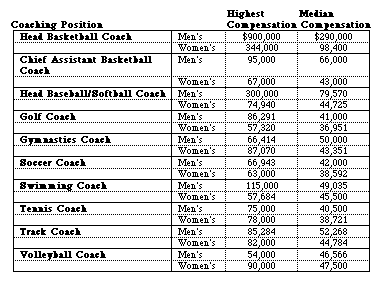|
SlamJam and the
Future
Part 2: Sexism
in Coaching Women's Teams
Sandoz
sees the increasing attention from moneyed interests as
taking something away from what has made women's athletics
special, and different from the lucrative men's organizations,
even while they provide women with more opportunities.
"I
do see the introduction of the marketplace into women's
sports as having a disruptive and detrimental effect on
what I loved about being an athlete," she says.
Sandoz feels that the major roadblock for women's sports
in terms of entering the mainstream is sexism.
"The
percentage of women administrators, coaches and officials
in women's sports programs is at an all-time low in U.S.
history," she says. "I can say that as soon as
there was financial reward in women's sport, men began to
see us as worth paying attention to, but not before."
Doug Feinberg coaches the New York Panthers, a SlamJam team
made up of girls from various private schools in Manhattan.
"Unfortunately," he says, "right now in the
WNBA, for marketing reasons, there are more men coaching.
But I think down the road there are going to be more women
in those spots."
Coaches'
Salaries for College Division I-A
Men's and Women's Coaches (1996-1997)

Chronicle of Higher Education
Click
Here
for
more statistics like this
|
Feinberg
believes that as more young women gain a better understanding
of the game, the more women coaches we’ll see in the
future.
"As
a guy having never been a teenage girl, I’ll never
be able to relate to teenaged girls the way a woman could,
to understand the mentality. This leads me to believe that
there will be more coaching opportunities for women in the
future."
"Not
to say that men can’t coach women," he quickly
points out.
"I’ve
coached now for five years, we’ve won 34 straight games,
so I’ve done something right, " he says. He has
developed different approaches to handling coaching situations
involving boys and girls. He has found that girls don’t
respond well to verbal reprimand.
"When
you yell at girls, they tend to quit on you, they don’t
want to play for you anymore, so you have to adapt,"
he says.
Nevertheless, he has seen a collective shift in attitude
over the past few years among girl players.
"In
the past, with girls, when they lost, it was ‘Oh, whatever,
so what are we doing tonight.’ Now, it’s getting
to the point where they lose a game they get mad, they get
pissed," he said.
He feels that this has both positive and negative aspects.
While the level of competitiveness has been raised, he is
aware that this can be taken too far.
"I
don’t think we’re even close to that point yet,
though. I can see it eventually happening," he said.
| "As
long as there are women out there, with the Title IX
situation, it’s not going to change. Women play
harder than men anyway." |
Feinberg agrees that the women’s basketball attracts
a different market. He doesn’t see the women’s
game and the style of play being quite so testosterone-charged
as the men’s game.
"There’s
definitely more of what [women] can do as a team, whereas
with the NBA, it’s like ‘WOW, look at that nice
move Vince Carter just made." He points out that there
have only been four dunks in the history of women’s
basketball.
"The
fundamentals are stressed more, so I think it’s more
of a family game. The atmosphere is more what the NBA used
to be. The WNBA may someday become what the NBA is now,
but I doubt it, just because of basic physical differences
between men and women," he said.
Sitting
at the administration table overlooking the basketball court
at St. Johns University’s Alumni Hall, Clyde Frazier
Jr. watches two teams participating in the April 2001 SlamJam
April Super 16 Tournament, a showcase for girls aged 16
and under.
"Ten
years ago, you never saw girls playing in this kind of venue,
at a major university," he says. "Girls playing
basketball used to be just a passing fancy, now girls play
hard and they’re getting better as the years progress.
They’re more aggressive, there are more girls playing,
and more girls playing well."
Feinberg shares his excitement.
"This
whole tournament is a showcase for college coaches to come
and seek kids during the period of time when they can recruit
them. These are all freshman, sophomores and juniors. This
is more about exposure for the kids than anything else,
" he said.
He thinks it is especially important for the private school
girls on his team, who rarely get to see the level of play
that the entire public school system has to offer.
"They
might think, ‘Oh, I’m a great ball player, they
get out here today, and see where they really stand,’"
he said.
"SlamJam
has been great for a lot of players. A lot of college coaches
come out and have the opportunity to see the players from
ninth grade on up, and recruit for the future. Now there’s
something to shoot for, it’s not just about going overseas,"
says Ron Moore, women’s coach at Five Towns College
on Long Island.
Moore believes that the sky is the limit for all women involved
in women’s sports.
"As
long as there are women out there, with the Title IX situation,
it’s not going to change. Women play harder than men
anyway," he said.
<<Back
to previous page
|



